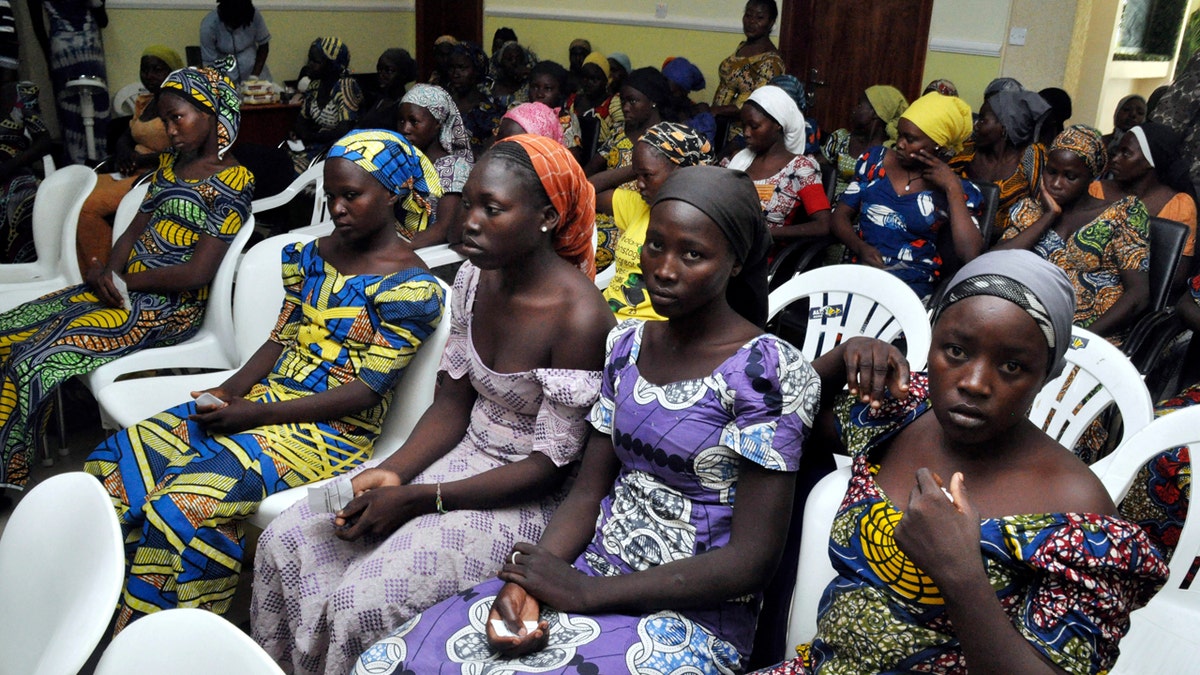
Chibok school girls recently freed from Boko Haram captivity are seen in Abuja, Nigeria, Sunday, May 7, 2017. (AP Photo/ Olamikan Gbemiga)
Five Boko Haram commanders were released in exchange for the freedom of 82 Chibok schoolgirls, a Nigerian government official told the Associated Press.
The confirmation of the prisoner swap came a day after the young women were liberated after more than three years in captivity by the Islamic militants.
There was no immediate comment about the exchange from the Nigerian presidency or Boko Haram, the extremists linked to the Islamic State group. President Muhammadu Buhari said Saturday that some Boko Haram prisoners had been released for the freedom of the schoolgirls, but he did not give any details.
A happy site for families missing loved ones: Some of the 82 released #ChibokGirls board an aircraft. pic.twitter.com/9yiJOUocQe
— ICRC Africa (@ICRC_Africa) May 7, 2017
The freed young women were flown Sunday by military helicopters from northeastern Nigeria to Abuja, the capital, where they were expected to meet the president.
"They will face a long and difficult process to rebuild their lives after the indescribable horror and trauma they have suffered at the hands of Boko Haram," said Pernille Ironside, acting representative of UNICEF Nigeria.
Authorities say 113 schoolgirls remain missing of the 276 girls abducted from their boarding school in 2014. Girls who escaped said some of their classmates had died from illness. Others did not want to come home because they'd been radicalized by their captors, they said.
Human rights advocates also fear some of the girls kidnapped from the Chibok boarding school were used by Boko Haram to carry out suicide bombings.
Related stories...
In Nigeria's capital, Abuja, anxious families were awaiting the official list of names of the 82 schoolgirls freed. Some parents have not lived long enough to see their daughters released, underscoring the tragedy of the three-year-long saga.
Last year, 21 other Chibok girls were liberated in October and they have been undergoing counseling for months. It was not immediately clear whether the newest girls freed Saturday would join them.
Those girls are still in government care in Abuja for medical attention, trauma counseling and rehabilitation, according to the government. Human rights groups have criticized the decision to keep the girls in custody in Abuja, nearly 900 kilometers (560 miles) from Chibok.
The newly freed schoolgirls should be quickly released to their families and not be subjected to lengthy government detention, Amnesty International's Nigeria office said, adding that they don't deserve to be put through a "publicity stunt" and deserve privacy.
The International Committee of the Red Cross, which along with the Swiss government has mediated negotiations between Nigeria's government and Boko Haram, said the girls soon would meet with their families.
Saturday's release marks the largest negotiated release so far of the 276 girls whose abduction in 2014 drew international attention to the threat of Nigeria's extremists. Boko Haram has pledged allegiance to the Islamic State, and has increasingly carried out attacks in neighboring countries.
The mass kidnapping horrified the world and brought Boko Haram international attention. The failure of Nigeria's former government to act quickly to free the girls sparked a global Bring Back Our Girls movement; U.S. first lady Michelle Obama posted a photo with its logo on social media.
The Bring Back Our Girls campaign said Sunday it was happy that Nigeria's government had committed to rescuing the 113 remaining schoolgirls.
"We urge the president and his government to earnestly pursue the release of all our Chibok girls and other abducted citizens of Nigeria," the group said in a statement.
The schoolgirls kidnapped from Chibok in 2014 are among thousands of people abducted by Boko Haram over the years.
A Nigerian military official with direct knowledge of the rescue operation said the freed girls were found near the town of Banki in Borno state near Cameroon.
Buhari late last year announced Boko Haram had been "crushed," but the group continues to carry out attacks in northern Nigeria and neighboring countries. Its insurgency has killed more than 20,000 people and driven 2.6 million from their homes, with millions facing starvation.
The Associated Press contributed to this report.